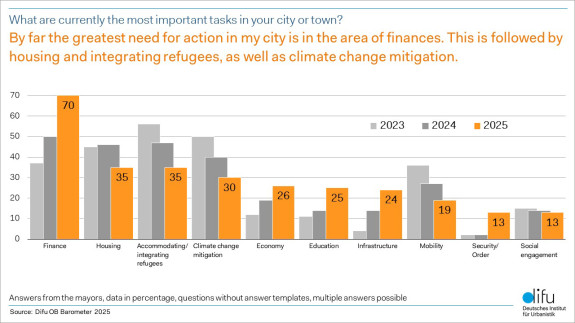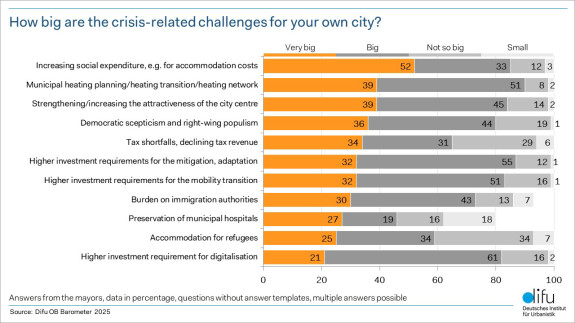
OB-Barometer: Finances are the dominant issue for cities
According to the city mayors, the issue of “municipal finances” was already the most important area of action for their own cities in 2024. However, this issue is gaining significant momentum once again in 2025: with 70% of mentions (compared with 50% in the previous year), mayors consider this issue to be twice as important as the subsequently ranked issues of housing, accommodating/integrating refugees, and climate change mitigation. Except for the influx of refugees in 2015, no other issue has been considered so relevant and urgent by city leaders since the beginning of the Difu survey series. There are also no differences between federal states or between city sizes. In line with these assessments of the financial situation, issues relating to the maintenance and expansion of municipal infrastructure as a whole, and school development in particular, are ranked as more important than ever before. A quarter of city leaders now cite these two areas of action as priorities, compared with 14% in the previous year.

The growing pressure on municipalities to spend is being exacerbated by further increases in social expenditure. According to the Association of German Cities (DST), municipal social expenditure has risen by at least a third in almost all areas over the past ten years, with some increases exceeding 100%. For instance, spending on child and youth welfare has more than doubled in ten years, rising from 32.8 billion euros to 67.6 billion euros nationwide, partly due to the substantial expansion of childcare provision.
When asked about the biggest crisis-related challenges, in which the mayors were asked to rate the significance of each challenge for their own cities, 85% cited rising social expenditure as a “very big” or “big” challenge. This situation is exacerbated by the expectation of tax shortfalls and declining tax revenues. More than two thirds of mayors see this as a “very big” or “big” challenge.

Assessments by political leaders for the coming years show that the dramatic increase in the significance of financial issues is not just a temporary phenomenon. For 68% of the respondents, finances remain the most important issue on the municipal agenda. No other issue has achieved such a high ranking in response to this question in the mayoral survey over the last ten years.
The most important issues of recent years, namely accommodating/integrating refugees and housing construction/affordable housing as well as “climate issues”, now rank far behind finances in terms of importance. Only around a third of the mayors identify these issues, which of course also have a financial impact, as the most important areas of action in their own cities at present. “Strengthening the economy” has also become more important as an issue. Stagnating economic development over the last two years is having a significant impact in this regard, which is clearly being felt at the municipal level.
City leaders believe that all these issues will remain important over the next five years. Once again, “climate issues” are moving up the political agenda in terms of their future importance, even surpassing the issues of accommodating refugees and housing construction. However, they are not nearly as important as they were in previous years.
In addition to the challenges posed by rising social expenditure coupled with falling tax revenues, 90% of mayors cite “climate issues”, such as implementing the heating transition and climate adaptation measures while meeting the associated investment requirements, as significant crisis-related challenges. “Strengthening and increasing the attractiveness of the city centre” also continues to be a concern for many cities. 84% of mayors continue to see this transformation as a “very big” or “big” challenge. In 2025, the issue of “democratic scepticism and right-wing populism” was included as a challenge for the first time. 80% of city leaders rate the need to address and deal with this issue as a “very big” or “big” challenge.
It may seem surprising at first that the pressure to accommodate refugees appears to have eased somewhat in comparison to previous years, with the proportion of city leaders seeing this as a significant challenge falling from over 90% in 2023 to just under 60% in 2025. This could be related to the fact that the number of asylum applications fell by almost a third in 2024 compared with 2023, as did the number of refugees fleeing to Germany. However, the municipalities continue to make it very clear in the current discussion that their financial resources will be nowhere near sufficient to meet the challenges of accommodating large numbers of refugees. This is why they require support from the federal level.
In 2025, financial policy is the area in which city leaders are most urgently calling for support from the federal states, the federal government or the EU. 81% cite this policy area, which is significantly higher than in 2024. All other policy areas are also rated much lower here. Housing policy remains important, with 58% of mayors mentioning it – an increase in importance compared with 2024 (53%) – alongside refugee policy, for which half of mayors continue to call for support.
The issue of finances will clearly dominate discussions in the municipalities in 2025, with regard to both current challenges and future prospects. The issue of finances should also always be seen in its thematic context: it concerns financial resources for the social sector, investments in infrastructure (especially schools, which also affects education policy), and climate adaptation measures. At the same time, the focus is also therefore on important location factors to make Germany, and specifically the municipalities, more attractive as a business location, supported by reducing non-monetary barriers to investment.
All municipalities are affected by these challenges: as in 2024, city leaders’ assessments and evaluations of the current situation in cities hardly differ between federal states or cities of different sizes.
Contact
Dr. Beate Hollbach-Grömig
+49 30 39001-293
hollbach-groemig [at] difu [dot] de